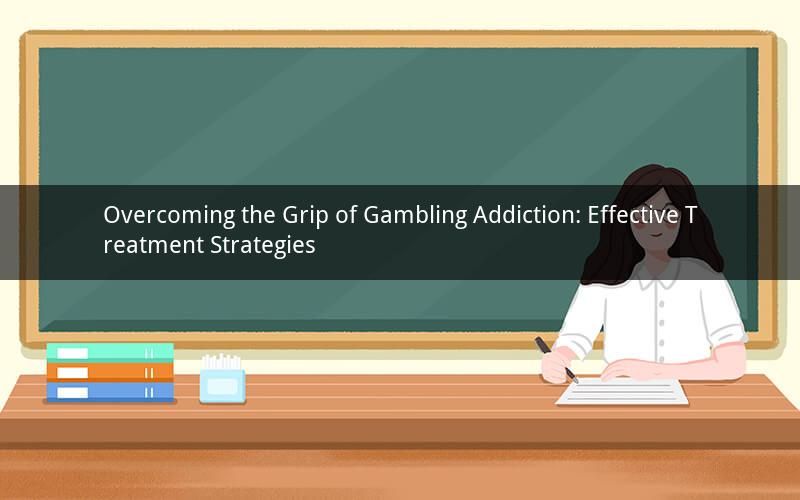
Gambling addiction, often referred to as compulsive gambling or problem gambling, is a serious issue affecting millions of individuals worldwide. This insatiable desire to gamble can lead to financial, emotional, and social problems. Treating gambling addiction requires a multi-faceted approach that addresses the root causes and helps individuals regain control over their lives. In this article, we will explore various treatment strategies to help those struggling with gambling addiction overcome their compulsive behavior.
1. Cognitive-Behavioral Therapy (CBT)
Cognitive-Behavioral Therapy (CBT) is a widely recognized and effective treatment for gambling addiction. This type of therapy focuses on identifying and changing negative thought patterns and behaviors that contribute to compulsive gambling. CBT helps individuals develop healthier coping mechanisms, problem-solving skills, and self-regulation strategies. Here's how CBT can be applied:
- Identifying and challenging gambling-related beliefs and thoughts.
- Learning to recognize and manage triggers that may lead to gambling.
- Developing healthier habits and activities to replace gambling.
- Learning to cope with stress, anxiety, and other emotions without turning to gambling.
2. Medication
In some cases, medication may be prescribed to help manage symptoms of gambling addiction. These medications are typically used to treat co-occurring mental health disorders, such as depression or anxiety, which may contribute to gambling behavior. Common medications include:
- Antidepressants: These medications can help alleviate symptoms of depression and anxiety, reducing the urge to gamble.
- Naltrexone: This medication blocks the brain's receptors that are activated by alcohol and opioids, reducing the pleasurable feeling associated with gambling.
- Clonidine: This medication is often prescribed to manage symptoms of withdrawal, such as irritability and anxiety.
3. Support Groups
Support groups provide a platform for individuals with gambling addiction to share their experiences, seek guidance, and receive support from others who understand their struggles. Some popular support groups include:
- Gamblers Anonymous: This 12-step program is similar to Alcoholics Anonymous and offers a structured framework for recovery.
- SMART Recovery: This non-12-step program focuses on self-empowerment and personal responsibility, helping individuals develop healthier lifestyles.
- Online support groups: Many individuals find comfort in online forums and chat rooms where they can share their experiences and seek advice.
4. Family Therapy
Gambling addiction can have a significant impact on family members, causing stress, conflict, and emotional turmoil. Family therapy can help address these issues and improve communication among family members. This type of therapy can:
- Identify and address the emotional and psychological impact of gambling addiction on family members.
- Teach family members how to support their loved one during recovery.
- Develop strategies to rebuild trust and strengthen family relationships.
5. Inpatient and Outpatient Treatment Programs
Inpatient and outpatient treatment programs provide structured and comprehensive care for individuals with gambling addiction. These programs typically offer a combination of therapy, support groups, and educational resources to help individuals overcome their addiction. Here are some key components of these programs:
- Individual therapy: Focused on addressing the unique needs and challenges of each individual.
- Group therapy: Provides a supportive environment for individuals to share their experiences and learn from others.
- Relapse prevention strategies: Equips individuals with the tools to avoid triggers and prevent relapse.
- Education: Teaches individuals about the nature of gambling addiction, its consequences, and strategies for recovery.
Frequently Asked Questions
Q1: How long does it take to recover from gambling addiction?
A1: The duration of recovery varies from person to person. Some individuals may experience immediate relief, while others may require ongoing treatment and support for several years.
Q2: Can medication alone help treat gambling addiction?
A2: While medication can be a helpful tool in managing symptoms of gambling addiction, it is most effective when combined with therapy and other treatment methods.
Q3: Are there any herbal remedies or alternative treatments for gambling addiction?
A3: There is limited scientific evidence to support the effectiveness of herbal remedies or alternative treatments for gambling addiction. It's important to consult with a healthcare professional before trying any alternative treatments.
Q4: Can family members be affected by a loved one's gambling addiction?
A4: Yes, family members can be significantly impacted by a loved one's gambling addiction, experiencing stress, financial strain, and emotional turmoil.
Q5: Is it possible to recover from gambling addiction without professional help?
A5: While some individuals may be able to overcome their addiction with the support of friends and family, seeking professional help is often the most effective way to achieve lasting recovery. Professional treatment provides structured support, evidence-based strategies, and access to resources that can aid in recovery.